Tuesday, May 30, 2006
Friday, May 26, 2006
From the Nipple to the Throttle

Okay, with my ardor for absurd action films, I don't know how I let three years transpire between the release of and my partaking in Charlie's Angels: Full Throttle. If you have not had the pleasure, allow me to be perhaps the first to inform you that it is WONDERFUL! Celebrity cameos abound(really, they pull everyone out of the woodwork - from Eric Bagosian to Jaclyn Smith, Carrie Fischer to Matt LeBlanc), the film finds its greatness in the fact that never, for a second does it take itself seriously. Instead its all wet T-shirts and plummeting helicopters, karate chops and bucking brontoes. Of course it helps that the arch villain is played by the exceptionally trashy (though, for that there need be no acting) Demi Moore, who had EVERTHING done for the film. Watching her writhe and wriggle her too-buffed, plasticine body is far more frightening than any horror film I have seen this year. The explosions and bad CGI are so bad they're great, the stunts so absurd they can do nothing but work. The only flaw in the film is Burney Mack who is so unfunny it hurts. But modern action could learn a lesson or 8 from this and the somewhat similar Transporter 2. Certainly the new and atrocious X-Men: The Last Stand (to read a more indepth review click here) could have had a little bit more fun with itself - instead of just being horrible. Might I, instead, recommend curling up with this one. It's really a hell of a lot more fun. And really, isn't that the point?
X-Hausted
What this film ends up doing is set the stage for an X-Men 4 where they won't have to pay so many big stars as, yes, the rumors are true, there are deaths. I won't say who, but in the trajectory of the film, they arrive entirely too soon to have any real emotional impact on us, leaving a mostly new stock of American Idol-esque X-teens. As can perhaps be gleaned by the comparison, none of these newbies have any sort of charisma. Charisma is the last thing on Brett Ratner's mind. Instead, it reads something like this: "Blow shit up! Explosions! Explosions!" And not in a good way. Previous destructive exploits yielded giddy pleasure where these just like fire for fire. If there's no plausibility in the film (and believe me, in this film it is a dirty word) than there are no consequences for any of the explosive action.
The film has entirely too many characters, and Ratner's claim to fame, the Rush Hour movies, are so duo heavy that an ensemble crew goes entirely to waste on him. None of the potentially fantastic new characters are given their moment in the sun - many of the figures on those poorly designed billboards which cover the city have 5 lines of dialogue, tops. Choosing to focus on Halle Berry doesn't help. Even when she's shooting bolts of lightning out of her fingertips, she's boring. Kelsey Gramer's Beast is also quite dull - again, because of this disdain for any plausible storylines. He is meant to be a political representative, but you never for a moment believe that a culture so mutant phobic would take advice from a bellowing furry blue beast.
The script is a succession of "wouldn't it be cool if..."s all threaded together with a very weak storyline. Everything moves along entirely too quickly and, similar to the would-be-critical plot of this year's Ultraviolet, the film never allows its audience to think about the terms of its claims. The premise is ponder worthy, surely. If there was a cure for difference, would you take it? But you can't see through the smoke of all the explosions long enough to think about much of anything. The rest is all parlor tricks. Those slight, cheap visual puns which make an audience snicker once, but leave a great lot to be desired. There's a scene where Magneto fantastically moves the Golden Gate bridge. When all is done, the couple in the car in front of him locks their doors. He shoots them a knowing look. The audience laughs. Snore.
Thursday, May 25, 2006
Musings on some Leading Ladies in rather dissimilar films.
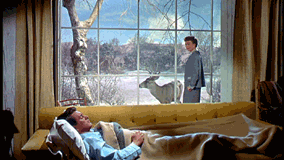 I'm sorry, but I simply cannot write enough about All That Heaven Allows. Just look at that picture for God's sake! This is what inspired everything from Polyester to 8 Femmes. Remember that deer that bookends the latter. Straight outta this! But there's also some wonderful bits of (almost) rebellious values here. This time around, the most harrowing moment of the film is when the "considerate" children purchase their mother a television, which in the main trajectory of the film, represents a self-resignation of the widowed woman and her dismissal of all of the dreams nurtured in youth. To look at this film after recently viewing Stella Dallas you experience a complete reversal of socio-economic values. In this world, the heart wins out over the pocketbook and those social codes which seemingly rule everyone else in this world, those which were the ruling moral purpose in Stella Dallas, are those codes which Wyman and Hudson are impervious to.
I'm sorry, but I simply cannot write enough about All That Heaven Allows. Just look at that picture for God's sake! This is what inspired everything from Polyester to 8 Femmes. Remember that deer that bookends the latter. Straight outta this! But there's also some wonderful bits of (almost) rebellious values here. This time around, the most harrowing moment of the film is when the "considerate" children purchase their mother a television, which in the main trajectory of the film, represents a self-resignation of the widowed woman and her dismissal of all of the dreams nurtured in youth. To look at this film after recently viewing Stella Dallas you experience a complete reversal of socio-economic values. In this world, the heart wins out over the pocketbook and those social codes which seemingly rule everyone else in this world, those which were the ruling moral purpose in Stella Dallas, are those codes which Wyman and Hudson are impervious to.
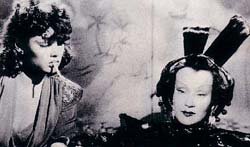 Next on my weekend trek, was Josef Von Sternberg's first Dietrich-free film, The Shanghai Gesture. Confused as the viewer is to whom will replace her, so too is the director. For the first 30 minutes, no one knows just who the "lead actress" is, especially Von Sternberg. We have three to choose from. Least interesting is Gene Tierney, who plays a rich woman with questionable morals (talk about a stretch). There's some trashy American girl who proves completely superfluous to the plot. The most interesting is Mother Gin Sling, who runs the illicit casino in which the entire film transpires. As you can see from above, perhaps the most sensational aspect of the film is her hair. It perpetually changing and only becomes more glorious, scene by scene, until the end, where she resembles an Asian Medusa. Resembles, but not is. The actress is SO British, her face tugged on just enough to create the "Asian eyes." You can imagine, solely from this example, how racist the film is, but then, Von Sternberg has never been known for his ethnic sensitivity. After Dietrich played a Spaniard, I think anything's possible (aside from racial realism). Gin Sling certainly becomes the Dietrich of the film; her past life proclivities prove to rule plot development and it is she who demands the vast majority of screen time, once the film decides that she is the lead lady. Sadly, the new DVD of the film is contemptibly awful.
Next on my weekend trek, was Josef Von Sternberg's first Dietrich-free film, The Shanghai Gesture. Confused as the viewer is to whom will replace her, so too is the director. For the first 30 minutes, no one knows just who the "lead actress" is, especially Von Sternberg. We have three to choose from. Least interesting is Gene Tierney, who plays a rich woman with questionable morals (talk about a stretch). There's some trashy American girl who proves completely superfluous to the plot. The most interesting is Mother Gin Sling, who runs the illicit casino in which the entire film transpires. As you can see from above, perhaps the most sensational aspect of the film is her hair. It perpetually changing and only becomes more glorious, scene by scene, until the end, where she resembles an Asian Medusa. Resembles, but not is. The actress is SO British, her face tugged on just enough to create the "Asian eyes." You can imagine, solely from this example, how racist the film is, but then, Von Sternberg has never been known for his ethnic sensitivity. After Dietrich played a Spaniard, I think anything's possible (aside from racial realism). Gin Sling certainly becomes the Dietrich of the film; her past life proclivities prove to rule plot development and it is she who demands the vast majority of screen time, once the film decides that she is the lead lady. Sadly, the new DVD of the film is contemptibly awful.
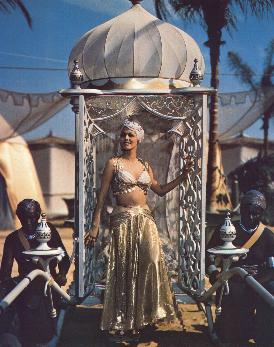 Arabian Nights: More Montez, por favor.
Arabian Nights: More Montez, por favor.
Actually, it took me this long to realize the context in which these "Exotic" Montez/John Hall/Sabu vehicles make sense. WWII escapism, pure and simple. Exotic, yet so far removed from Germany that you may revel in the lush dress and foliage of more "Savage" lands. This one is quite forgettable, however. Try Cobra Woman instead (if you can find it).
 I rented Sunday, Bloody Sunday just to watch Glenda Jackson, whom I think of as one of the few truly Great film actresses. I could watch her do anything. Her majesty just radiates from her otherwise humble countenance. The film concerns a bisexual (before the term existed) boy who flits from a relationship with Jackson's Alex and Peter Finch's Daniel. Whenever the dreaded thing known as responsibility enters his life, he exits. It is a film of its very particular time and place. Oozing all of the thematic and stylistic tropes fundamental to British cinema of the early Seventies, the film is a good one, but does not stand out like Women in Love, say. Of course, the representation of a homosexual love affair was bold and startling for its time, though now it seems sadly censored and pales in the complexity of the heterosexual relationship. Though celebrated for Finch's "audacity," Jackson is the real reason to watch the film. Her intellectual (and tortured poor little rich girl) performance is really a treat. Look out for the irredeemably sexy Jon Finch as one of Daniel's tricks. Mmmmmmm... A very interesting bit of trivia that alter the entire film's reception: Alan Bates was initially slated to play Daniel, but was to busy filming The Go-Between. In the original screenplay, Daniel was written far younger. And I must admit, this would have made a far more dynamic film.
I rented Sunday, Bloody Sunday just to watch Glenda Jackson, whom I think of as one of the few truly Great film actresses. I could watch her do anything. Her majesty just radiates from her otherwise humble countenance. The film concerns a bisexual (before the term existed) boy who flits from a relationship with Jackson's Alex and Peter Finch's Daniel. Whenever the dreaded thing known as responsibility enters his life, he exits. It is a film of its very particular time and place. Oozing all of the thematic and stylistic tropes fundamental to British cinema of the early Seventies, the film is a good one, but does not stand out like Women in Love, say. Of course, the representation of a homosexual love affair was bold and startling for its time, though now it seems sadly censored and pales in the complexity of the heterosexual relationship. Though celebrated for Finch's "audacity," Jackson is the real reason to watch the film. Her intellectual (and tortured poor little rich girl) performance is really a treat. Look out for the irredeemably sexy Jon Finch as one of Daniel's tricks. Mmmmmmm... A very interesting bit of trivia that alter the entire film's reception: Alan Bates was initially slated to play Daniel, but was to busy filming The Go-Between. In the original screenplay, Daniel was written far younger. And I must admit, this would have made a far more dynamic film.
Tuesday, May 23, 2006
Happy Birthday, Dahling...
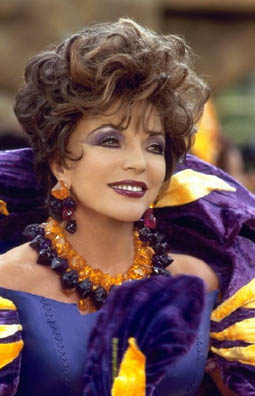 I would like to wish a very special birthday to miss Joan Collins who turns 9... 73 today! Happy Birthday Joan. There are talks in the pipeline ('case you haven't heard) of there being a Dynasty movie(as is Dallas). Two contradictory websites have claimed either: Victoria Bekham will play Collins' Alexis character, however, I have also read that it is in Collins' contract that no one can ever play Alexis but Collins, making a film version impossible. Almost. For those of you who have never seen it (well, you probably shouldn't, but...) the film Sextette starred Mae West as a 20, maybe 30 something woman. At the time however, West was 85. As in Strangers With Candy, no one in the film appears to notice that the star is geriatric. Now, wouldn't that be interesting (or at least perplexing), having Collins reprise her role as Alexis 25 years after the fact. Just food for thought.
I would like to wish a very special birthday to miss Joan Collins who turns 9... 73 today! Happy Birthday Joan. There are talks in the pipeline ('case you haven't heard) of there being a Dynasty movie(as is Dallas). Two contradictory websites have claimed either: Victoria Bekham will play Collins' Alexis character, however, I have also read that it is in Collins' contract that no one can ever play Alexis but Collins, making a film version impossible. Almost. For those of you who have never seen it (well, you probably shouldn't, but...) the film Sextette starred Mae West as a 20, maybe 30 something woman. At the time however, West was 85. As in Strangers With Candy, no one in the film appears to notice that the star is geriatric. Now, wouldn't that be interesting (or at least perplexing), having Collins reprise her role as Alexis 25 years after the fact. Just food for thought.
Monday, May 22, 2006
Sorry!
Allow this post to function as a formal apology and explanation as to why the posts here have been infrequent at best. As you may know, I write for film.flukiest.com ('cause they pay me). That sucks up a lot of my daily postage. I have also been working on longer writings for my actual portfolio (we're talking grad school here folks). Expect excerpts of these long endeavors here shortly, but also look for another little 'zine like thing at Skylight in the next month or so(the subject will be Grace Jones!) I'll be writing more soon. That's a promise
Friday, May 12, 2006
Jones'd
 Last night, inspired by a 2004 performance I caught on You Tube of Slave To The Rhythm, I watched Grace Jones' One Man Show. It's a video that's far more concept than concert, and all the better for it. Taking cues from Bowie and Kraftwerk, Jones' performance is just that. Not one song is sung without a great consideration paid to its performative promise. When 'Walking in the Rain' begins, the fierce creature who has just transitioned from a cymbal demolishing maniac must look to the sky at the thunderous lightning crashes. She transforms.
Last night, inspired by a 2004 performance I caught on You Tube of Slave To The Rhythm, I watched Grace Jones' One Man Show. It's a video that's far more concept than concert, and all the better for it. Taking cues from Bowie and Kraftwerk, Jones' performance is just that. Not one song is sung without a great consideration paid to its performative promise. When 'Walking in the Rain' begins, the fierce creature who has just transitioned from a cymbal demolishing maniac must look to the sky at the thunderous lightning crashes. She transforms.
Jones is no stranger to performance. It could easily be claimed that her whole life is one big performance. She certainly still keeps the headlines busy - slapping train station attendants and baring her breasts at Disneyworld. And though concept performances existed before Jones, there was something so severe about the persona she had created, particularly when considering the increasing effects of post-colonialism. Jones not only questioned what it was to be female, she treated those feminine conventions (among many other stereotypes)like a cat would a bird. Finally, the obliterated convention was overturned for Jones' persona - certainly more anima than animus.
A One Man Show coincided with the release of Jones' Nightclubbing LP which contained her biggest hit, 'Pull Up To The Bumper.' Still collaborating with her paramour/stylist, Jean-Paul Goude, Jones' assembled the show as a free flowing set of performance pieces. The video starts with flashes of her previous incarnations as seen through the lens of Goude's camera. After a title flashes across the screen, an ape is held in spotlight atop a large, spare staircase. She wears a cymbal on her head and bright red lipstick. She rolls the snare drum which is affixed at her side. Of course the scene is an obvious musical referent to Dietrich's famous performance of 'Hot Voodoo' in Josef Von Sternberg's Blonde Venus. Jones' ape is considerably "prettier" which provides an even greater divide between the mask and the masked. Dietrich's ape was beastly because she was the absolute antithesis of beastly. Jones' ape is more a pet who is made savage by the revelation that she is human. Taking the dichotomy theaticized by Dietrich and subverting it as a comment on racial generalizations, the opening moments of A One Man Show prove rich with interpretive meaning.
This leads into 'Warm Leatherette.' A Jones lookalike peels the ape skin from her body and jumps to the top of a yellow industrial cherry picker. As the machine lowers the alternate Jones to the ground, we encounter another Jones positioned amid cymbals on stantions. This "real" Jones stands poised, arms above her head, with a drumstick in each hand. The mallets crash on the cymbals and replace the "Warm" in 'Warm Leatherette.'
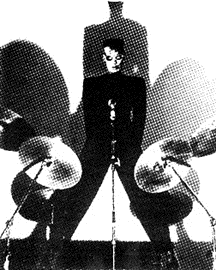 In 'Feel Up,' the musicians sit in a line on stage, all donning Grace Jones masks. We watch various Joneses beat drums and strum guitars all with the same mechanical movements - imagine a row of cymbal clapping monkeys. Again, the "real" Jones is finally shown to the side - just one in the procession. She dramatically beats a drum slowly slipping from her neutral facial features (so as to resemble all of the other Joneses), becoming more severe and maniacal, spitting the lines of her improvised rap. It is something pulled straight from the pages of Baudrillard's 'Precession of the Simulacra' as the celebrity becomes second to those look-alikes which surround her. That the lookalikes are men only aides in the richness of Jones' performative prowess.
In 'Feel Up,' the musicians sit in a line on stage, all donning Grace Jones masks. We watch various Joneses beat drums and strum guitars all with the same mechanical movements - imagine a row of cymbal clapping monkeys. Again, the "real" Jones is finally shown to the side - just one in the procession. She dramatically beats a drum slowly slipping from her neutral facial features (so as to resemble all of the other Joneses), becoming more severe and maniacal, spitting the lines of her improvised rap. It is something pulled straight from the pages of Baudrillard's 'Precession of the Simulacra' as the celebrity becomes second to those look-alikes which surround her. That the lookalikes are men only aides in the richness of Jones' performative prowess.
 Perhaps the main highlight of the video lies in Jones' performance of 'La Vie En Rose.' Her first hit was released before Jones' transformation via Goude. What was initially yielded as traditional Disco with Jones crooning over twinkling pianos and lite-strumed guitar, here suffers no alteration in terms of musical arrangement, yet Jones, aware of the disconnect in stylistic presentation, performs the song with a schizophrenic glee. She begins the song with what has become her trademark vocal delivery. She angrily speaks the lines of one of France's greatest love songs. Fans of the original version might at first believe she is ruining it, yet as the song progresses, our chanteuse slips mid-phrase into the soaring vocals that originally accompanied the song. Vocally teetering between vengeful force and complete amorous devotion, the performance becomes a duet in a single mind. Of course the crooning rapture of Jones' Disco delivery is the wanted version, it all the more cherished because coldness of her initial approach to the song.
Perhaps the main highlight of the video lies in Jones' performance of 'La Vie En Rose.' Her first hit was released before Jones' transformation via Goude. What was initially yielded as traditional Disco with Jones crooning over twinkling pianos and lite-strumed guitar, here suffers no alteration in terms of musical arrangement, yet Jones, aware of the disconnect in stylistic presentation, performs the song with a schizophrenic glee. She begins the song with what has become her trademark vocal delivery. She angrily speaks the lines of one of France's greatest love songs. Fans of the original version might at first believe she is ruining it, yet as the song progresses, our chanteuse slips mid-phrase into the soaring vocals that originally accompanied the song. Vocally teetering between vengeful force and complete amorous devotion, the performance becomes a duet in a single mind. Of course the crooning rapture of Jones' Disco delivery is the wanted version, it all the more cherished because coldness of her initial approach to the song.
A fantastic rendition of 'Demolition Man' and 'Pull Up to the Bumper' follow, then the video begins to lose steam as the live performance footage is primarily replaced by music video footage. 'Private Life,' 'My Jamaican Guy,' 'Living My Life,' and 'Libertango (I've Seen That Face Before)' all appear as isolated music videos - the latter two being the most memorable, showing Grace in a giant polka-dotted dress in no way dissimilar to those upside-down salad bowls the Pet Shop Boys wore on their heads in the promo video for 'Go West.' In opening moments of 'Living My Life,' Jones emerges from within the giant dress only to point a pistol to her head and pull the trigger. A group of similarly clad dancers disseminate and Jones whirls about inside the spinning dress. 'Libertango (I've Seen That Face Before)' closes the video with Grace, masked in sharply pointed fluorescent appendages, removing one piece after another. Transformed, a suit clad and mask free Jones clutches an accordion screaming the French lyrics of the song. As the camera pans out, we find Jones on a New York City rooftop, surrounded by applauding white be-gloved fans whom all have similar hats upon their heads.
Though I am certainly no expert when it comes to theatrical performance, Camp gesture and theoretic analysis are certainly on my side. And these are the capabilities that left me slack-jawed last night, only to hit play again and experience that whole thing once more. I have always adored Grace Jones, and this is why. There are no easy answers in her self (which I present here as standing for her music, the performance of her persona and her film roles - which, more often than not, are an extension of that persona). Jones refuses to abide by any typical moniker (perhaps other than crazy) making her one of the most complexly created media personalities of our time. It is rumored that a comeback is in the works. Please, Grace is just what this world needs.
Thursday, May 11, 2006
Estrogenerational - 20s years of Women's films
In preparation for a project I have recently began work on, I rented 6 1950's Women's' films and though I realize that they may be the tawdriest or at very least cheap films of their times, there is really something very special going on here. Let's take a trek through Womanland USA!
 The first stop was, fittingly, the Sirkian melodrama Magnificent Obsession. Sirk has always been considered one of the greats of the Women's' film. Magnificent Obsession is a tremendous case in point. The ludicrous plotline follows Jane Wyman whose life is accidentally ruined, little by little, by a hedonistic playboy, Rock Hudson. Left widowed and blind, Wyman inspires in Rock a determination to cure her of all of the ills that he had caused (this side of reanimation, of course). The soaring orchestral score and the wonderful technicolor shots of foliage and wildlife provide the emotionally decadent backdrop for this plunge into the feminine sea. Wish fulfillment at his finest, this is truly up there with his Criterion celebrated All That Heaven Allows and Written on the Wind.
The first stop was, fittingly, the Sirkian melodrama Magnificent Obsession. Sirk has always been considered one of the greats of the Women's' film. Magnificent Obsession is a tremendous case in point. The ludicrous plotline follows Jane Wyman whose life is accidentally ruined, little by little, by a hedonistic playboy, Rock Hudson. Left widowed and blind, Wyman inspires in Rock a determination to cure her of all of the ills that he had caused (this side of reanimation, of course). The soaring orchestral score and the wonderful technicolor shots of foliage and wildlife provide the emotionally decadent backdrop for this plunge into the feminine sea. Wish fulfillment at his finest, this is truly up there with his Criterion celebrated All That Heaven Allows and Written on the Wind.
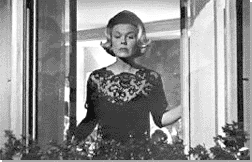 In Midnight Lace, Doris Day strives to prove to the world that the threats being made on her life in anonymous telephone calls are not, as everyone suspects, hysteric outbursts, but actual occurrences. It is a tad more run-of-the-mill Housewife Hysteria and less deserving of applause than Magnificent Obsession, though it does have its moments. As it is Doris Day, the set design and costuming are decidedly lavish. Shot in color, this is the type of film where the hues leap from the screen in their intoxicating reds and meridian blues.
In Midnight Lace, Doris Day strives to prove to the world that the threats being made on her life in anonymous telephone calls are not, as everyone suspects, hysteric outbursts, but actual occurrences. It is a tad more run-of-the-mill Housewife Hysteria and less deserving of applause than Magnificent Obsession, though it does have its moments. As it is Doris Day, the set design and costuming are decidedly lavish. Shot in color, this is the type of film where the hues leap from the screen in their intoxicating reds and meridian blues.
 To be perfectly honest, I didn't watch Strangers When We Meet all the way through. It was too much Kirk Douglas, too little Kim Novak. A good forty-five minutes in and the drama had escalated to little more than some light weight infidelity.
To be perfectly honest, I didn't watch Strangers When We Meet all the way through. It was too much Kirk Douglas, too little Kim Novak. A good forty-five minutes in and the drama had escalated to little more than some light weight infidelity.
 As an alternate to the obedient housewife, Hollywood started putting out housewife turned bad movies. Crime of Passion starring Barbara Stanwyck and Sterling Hayden is one such movie. Possessing a wonderful dramatic build, the film is a good example of where Melodrama and Noir intersect. The ever-fascinating Stanwyck does a great turn at a frustrated thinking woman, though, given to the times, once she's wed, her thinking goes out the window in favor of ambition.
As an alternate to the obedient housewife, Hollywood started putting out housewife turned bad movies. Crime of Passion starring Barbara Stanwyck and Sterling Hayden is one such movie. Possessing a wonderful dramatic build, the film is a good example of where Melodrama and Noir intersect. The ever-fascinating Stanwyck does a great turn at a frustrated thinking woman, though, given to the times, once she's wed, her thinking goes out the window in favor of ambition.
 And the winner of the wicked award was Leave Her To Heaven. Jane Tierney portrays an obsessive housewife who cuts down anything that stands betwixt her and her love - including his brother and unborn son! This is really more Noir than anything else, all the more interesting as it is in lurid technicolor.
And the winner of the wicked award was Leave Her To Heaven. Jane Tierney portrays an obsessive housewife who cuts down anything that stands betwixt her and her love - including his brother and unborn son! This is really more Noir than anything else, all the more interesting as it is in lurid technicolor.
It's always interesting what one picks up on watching such similar films in one small period. The metaphoric relationship between domesticity and prison is remarkably prevalent. In every film, our heroines stand behind a curtained window, peering through the wooden "bars" of the window's frame. The home thus becomes a psychological prison for each of these women, though this idea is something that manifests itself in different plot creations. For Wyman, her blindness signals a loss of the home. With her newlywed husband dead, she is incapable of becoming trapped. She instead falls into a lustful psychological trap of her own invention as she is blinded by Rock's advances.
Women are also never to be trusted. Though our protagonists, they suffer from the worst of dramatic ironies. Everyone in the audience knows the plotpoints better than these poor women. And we watch as they fumble to gain a grasp on the respectable world which crumbles around them. Though these films are certainly the great-grandparents of today's Women's films - from Flightplan to Lifetime Original Television Movies - there was a certain popular psychology to them. Current pop cinema can't be bothered with psychology. We don't watch Jodie Foster fall into her neurotic coma, she starts out that way. There's no emotive cause and effect, and that, above all else, is what allows these earliest works to truly shine.
Wednesday, May 10, 2006
Superman, not quite
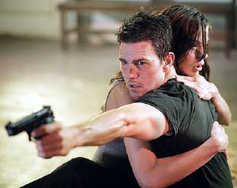 Yesterday, I did the unthinkable. I attended a matinee screening (so as to not let those scientologists get all of my money) of Mission Impossible 3. The film was just what it needed to be. It was a fast burst of adrenaline. It was an around the world sweeping emotional fiasco. Our hardly fleshed out crew of ethnically diverse Impossible missionaries jump from Berlin to the Vatican to Shanghai. Phillip Seymore Hoffman was fine as the baddie, though he could have been a bit more bad. The most fun, however, was watching Tom Cruise play American man. As he has recently been compared to Michael Jackson, Cruise looks lost in the labyrinth of normalcy. 'How did I get here?' Cruise may wonder. And to that there is no easy answer, but nowhere near impossible.
Yesterday, I did the unthinkable. I attended a matinee screening (so as to not let those scientologists get all of my money) of Mission Impossible 3. The film was just what it needed to be. It was a fast burst of adrenaline. It was an around the world sweeping emotional fiasco. Our hardly fleshed out crew of ethnically diverse Impossible missionaries jump from Berlin to the Vatican to Shanghai. Phillip Seymore Hoffman was fine as the baddie, though he could have been a bit more bad. The most fun, however, was watching Tom Cruise play American man. As he has recently been compared to Michael Jackson, Cruise looks lost in the labyrinth of normalcy. 'How did I get here?' Cruise may wonder. And to that there is no easy answer, but nowhere near impossible.
Monday, May 08, 2006
Booo!!
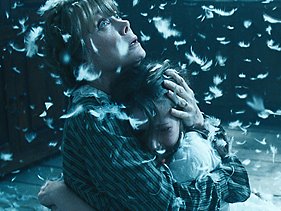 If you enjoy watching facsimile films which tear entire chunks from more lively precessors with an uncompromisingly lifeless vigor, then An American Haunting is your movie. For anyone else who respects those things that seem wholly unimportant these days like script and plot development, sit this one out. True, the film does star horror alumns Sissy Spacek and Donald Sutherland, yet in the wrong hands, these actors might as well be mannequins. Then there would be something original to the film, rather than their stabs like "ghosty cam," which of course whirls about the room and flickers from color to black and white, creepy dead girls (which should really be done away with altogether - especially the ones whom you touch and watch decay in a matter of seconds) and moral add-ons which render the triteness which you are watching unfold insurmountable. There is no mysterious tension which can make even the worst ghost story remotely compelling. Instead you have a blatantly studio set "haunted house" with more reshot scenes than not and a contemporary tie in that shows even less energy than the ahem... spiritless period segments. This film may have singlehandedly made me see far fewer big budget Hollywood films this summer. So, in retrospect, maybe it wasn't all that bad.
If you enjoy watching facsimile films which tear entire chunks from more lively precessors with an uncompromisingly lifeless vigor, then An American Haunting is your movie. For anyone else who respects those things that seem wholly unimportant these days like script and plot development, sit this one out. True, the film does star horror alumns Sissy Spacek and Donald Sutherland, yet in the wrong hands, these actors might as well be mannequins. Then there would be something original to the film, rather than their stabs like "ghosty cam," which of course whirls about the room and flickers from color to black and white, creepy dead girls (which should really be done away with altogether - especially the ones whom you touch and watch decay in a matter of seconds) and moral add-ons which render the triteness which you are watching unfold insurmountable. There is no mysterious tension which can make even the worst ghost story remotely compelling. Instead you have a blatantly studio set "haunted house" with more reshot scenes than not and a contemporary tie in that shows even less energy than the ahem... spiritless period segments. This film may have singlehandedly made me see far fewer big budget Hollywood films this summer. So, in retrospect, maybe it wasn't all that bad.
Saturday, May 06, 2006
Immaculate, Rational, Perfect
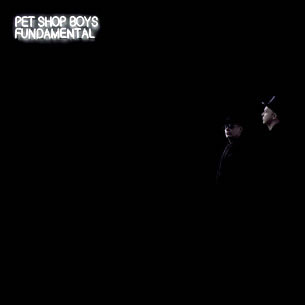 Okay, so this is a film blog, but I just can't fathom not writing about the new album by the Pet Shop Boys who penned the song from which this blog takes its namesake. Its judgment is coming from a biased source, but I've stuck through the boys in some really bad phases and (though personally adoring them) critically lambasted them, so it comes with great glee that I celebrate Fundamental's erudite greatness. They knew they had to produce something special. Release, their last album proper, was universally reviled. Chart hits have been few and far between and you could feel the record labels breathing down their necks with 2004's 'best of' PopArt. Success was essential if they were to survive big-label banishment. Succeed they did. It is, really, in a word which totally befits the boys, fabulous. When the first reviews surfaced in December, Popjustice likened the album to the PSB opus Very. Expecting an indulgently energetic album(as Very was aptly named for its excesses), I was initially taken off guard by Fundamental's restraint.
Okay, so this is a film blog, but I just can't fathom not writing about the new album by the Pet Shop Boys who penned the song from which this blog takes its namesake. Its judgment is coming from a biased source, but I've stuck through the boys in some really bad phases and (though personally adoring them) critically lambasted them, so it comes with great glee that I celebrate Fundamental's erudite greatness. They knew they had to produce something special. Release, their last album proper, was universally reviled. Chart hits have been few and far between and you could feel the record labels breathing down their necks with 2004's 'best of' PopArt. Success was essential if they were to survive big-label banishment. Succeed they did. It is, really, in a word which totally befits the boys, fabulous. When the first reviews surfaced in December, Popjustice likened the album to the PSB opus Very. Expecting an indulgently energetic album(as Very was aptly named for its excesses), I was initially taken off guard by Fundamental's restraint.
Produced by the infamous Trevor Horn (who has held the hands discofaves like Grace Jones and Frankie Goes To Hollywood in addition to producing the phenomenal PSB track, "Left To My Own Devices"), one might expect an entire album of crashing cymbals and Dunga-Din drums. Though they're there with all of their glittering glory, both producer and produced alike display their maturity. Their careful handling of the quiet and therefore less pop-driven tracks show a measure of importance typically absent on Pop records. Try as they might, earlier PSB tracks similar in nature have proven lackluster (take for instance Nightlife's "Only One" or just about every track on Release). On Fundamental, such songs find their day in the sun. Though criticized by Popjustice, the track "Twentieth Century," and similar, side B songs reach greater heights than they might have found on previous records.
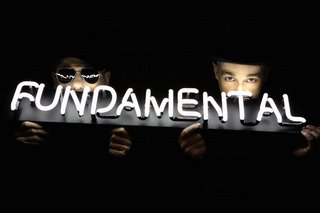
Fundamental's main strength however, lies in its concept. No stranger to concept albums, it is by far the Boys' most cohesive and critical album. They have never been as well spoken as they can be found here. Witty aphorisms abound, this is a purely adult pop album. After all, teen targeted pop albums do not typically use words like supplicant. Britney Spears' best of was titled My Prerogative, though I'm still quite certain she has no idea what that word means. The Pet Shop Boys, on the other hand enjoy wielding their well read vocabulary and sometimes rather supercilious opinions, demonizing Britain's proposed ID card system with "Integral" (If you've something to hide / you shouldn't even be here), the bourgeois apathy of minimalist decor (decide something less decisional) and painting a relationship more sexual in nature between Tony Blair and George Bush (Ooh Ooh, I'm with Stupid). The PSB's cultural observations (and disapprovals) are bold gestures for a pop group. In recent interviews, gaping jaws meet the admission of who exactly is being parodied in "I'm with Stupid." As poignant as these jabs are, without the impeccable energy and taut compositional prowess, the album would merely be a one note symphony.
Instead, tracks like the absolute Trevor Horn-y number "The Sodom and Gomorrah Show," which starts with a ring master calling out "Sun! Sex! Sin! Divine Intervention! Death! and Destruction!" builds to orgiastic choruses well suited for the track's subject matter. That grand opuses such as this are followed by fantastically atmospheric tracks like "I Made My Excuses and Left," whose nearly two minute introduction beautifully blends into the atypical story structure of the narrative track, only adds to the musical complexity of the album. Never staying on one path for too long, grandiose tracks lead into more somber, meditative ones - only to be revived yet again by the pulsing throb of the proceeding song. The odd duck here is the Hit writer Diane Warren scribed, "Numb" which seems more fit for Celine Dion than the Pet Shop Boys, though they bring their requisite melancholia to it is perhaps saved by its precession to the thrillingly up tempo "God Willing."
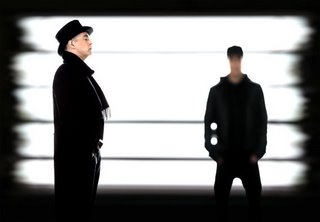 The album is a somewhat surprisingly welcomed contrast to their rather cheaply produced Disco 3 which pitted a generous handful of new, electro-heavy tracks alongside complimentingly thumpa-thumpa remixes. It was a great little E.P. but, to follow up with an album so similar in nature would have been a poor decision. One imagines the remixes and special edition (titled Fundamentalism, of course) will fulfill that desire. Instead we have a fundamentally Pet Shop Boys, Pet Shop Boys' album - back in style to remind us just why they are here in the first place.
The album is a somewhat surprisingly welcomed contrast to their rather cheaply produced Disco 3 which pitted a generous handful of new, electro-heavy tracks alongside complimentingly thumpa-thumpa remixes. It was a great little E.P. but, to follow up with an album so similar in nature would have been a poor decision. One imagines the remixes and special edition (titled Fundamentalism, of course) will fulfill that desire. Instead we have a fundamentally Pet Shop Boys, Pet Shop Boys' album - back in style to remind us just why they are here in the first place.
Thursday, May 04, 2006
The Man with his Movie Camera
 Anyone who has had the unfortunate displeasure of listening to the soundtrack Björk birthed for Matthew Barney's Drawing Restraint 9 might have had an understanding of what they were getting themselves into entering the theater for the 2:15 minute extravaganza. Furthermore, someone who sat through Barney's 5 part Cremaster Cycle might have known that, while proceeding through the cycle, Barney's narcissitc showmanship began to take center stage - before the alleged subject. And were one to sit down with Mr. Barney and chat, he could make sense of every moment of Drawing Restraint 9, leaving you only moments later to wonder, 'wait, that really doesn't make any sense at all.' In fact, what we have is a contemporary art world Emporer's New Clothes. His sets and periphanalia are fetishitically beautiful, of that we have not doubt, but Mr. Barney as experimental filmmaker (or, as he prefers, a narrative sculptor), leaves a tad too much to be desired.
Anyone who has had the unfortunate displeasure of listening to the soundtrack Björk birthed for Matthew Barney's Drawing Restraint 9 might have had an understanding of what they were getting themselves into entering the theater for the 2:15 minute extravaganza. Furthermore, someone who sat through Barney's 5 part Cremaster Cycle might have known that, while proceeding through the cycle, Barney's narcissitc showmanship began to take center stage - before the alleged subject. And were one to sit down with Mr. Barney and chat, he could make sense of every moment of Drawing Restraint 9, leaving you only moments later to wonder, 'wait, that really doesn't make any sense at all.' In fact, what we have is a contemporary art world Emporer's New Clothes. His sets and periphanalia are fetishitically beautiful, of that we have not doubt, but Mr. Barney as experimental filmmaker (or, as he prefers, a narrative sculptor), leaves a tad too much to be desired.
Without becoming to personable, I went to CalArts, and though majoring in the Fine Art department, the majority of my labors were spent in the Film school. I have seen more experimental films than I care to admit to. I love them. It is truly my primary passion. There is a delivery that must come in demanding experimental works. It is the moment that hits you like a tidal wave, when suddenly you understand why you have been looking at this one thing for 30-odd minutes. You must experience it in order for this work, at least in my mind, to have value. That moment, however, does not come in Mr. Barney's film.
What then, is Drawing Restrain 9 if not an experimental film? It is a love letter from Matthew Barney and Björk to Matthew Barney and Björk. I would say, without trying to be too snyde, that is the primary purpose for this. They both narcissistically pose and move with a lathargically self-important vigor. The camera, ever present in their performative inneptitude. Both have taken their self-indulgences entirely too far - and what is yeilded, however "avant-garde" people might claim, is absolutely mediocre. Avant Garde is not synonymous with bad. Watching Drawing Restraint 9, I exerienced a similar emotion as the first time I listened to Björk's last proper album(Medúlla): embarasssement. I felt embarrassed that these two potentially talented people (I have been fans of both artists' works in the past) yielded such great works of self-love. Barney (and in a lesser way, Björk as well) has created a formula where, since the work is "experimental, confused people = good art. Not always the case. There is a language to such film, one to which this barely abides.
Wednesday, May 03, 2006
Planet of the Hippie Vampires
 Last night I watched a funny little film called The Omega Man. Cult classic to some, unknown to others, this post-apocalyptic film starring Charlton Heston is a big boiling cauldron of race issues. Like the republican side to the Dawn of the Dead coin, Heston's Neville runs about downtown LA with automatic machine guns shooting at, what Thom Andersen describes in his hilarious reproach of Los Angeles in the movies, Los Angeles Plays Itself as "nomadic hippie vampires," who of course only come out at night. It's an odd film, really. Using Heston, post-Apes to convey a society distraught with communists (the hippie vampires) and reveling in his automatic rifles (quel foreshadowing). By the time Lisa, who seems to have just stepped out of the SLA, shacks up with Heston, you just stop trying to figure out the socio-economic politic of the film and just allow its wonderful mediocrity to wash over you. Enjoy with a great big glass of something or other. You will enjoy.
Last night I watched a funny little film called The Omega Man. Cult classic to some, unknown to others, this post-apocalyptic film starring Charlton Heston is a big boiling cauldron of race issues. Like the republican side to the Dawn of the Dead coin, Heston's Neville runs about downtown LA with automatic machine guns shooting at, what Thom Andersen describes in his hilarious reproach of Los Angeles in the movies, Los Angeles Plays Itself as "nomadic hippie vampires," who of course only come out at night. It's an odd film, really. Using Heston, post-Apes to convey a society distraught with communists (the hippie vampires) and reveling in his automatic rifles (quel foreshadowing). By the time Lisa, who seems to have just stepped out of the SLA, shacks up with Heston, you just stop trying to figure out the socio-economic politic of the film and just allow its wonderful mediocrity to wash over you. Enjoy with a great big glass of something or other. You will enjoy.
Monday, May 01, 2006
Growing up a Beautiful Thing
 There are a couple films that marked my adolescence and formulated my development as an adult. Those films are those that also lent a hand to my understanding of emotional validation and expectation. I used to fall asleep to Clueless. I learned many a witty aphorism from Cher. Rather fortunately, my coming of age film was Beautiful Thing. I couldn't imagine a better one. A tender and earnest "urban fairy tale," Beautiful Thing is one of those rare films whose humbleness and honesty earned it incredible acclaim and a rather enormous fan base considering its extremely modest budget. My point here is not to plug the film, as most people who would happen upon this site (and read past the first sentence) probably have.
There are a couple films that marked my adolescence and formulated my development as an adult. Those films are those that also lent a hand to my understanding of emotional validation and expectation. I used to fall asleep to Clueless. I learned many a witty aphorism from Cher. Rather fortunately, my coming of age film was Beautiful Thing. I couldn't imagine a better one. A tender and earnest "urban fairy tale," Beautiful Thing is one of those rare films whose humbleness and honesty earned it incredible acclaim and a rather enormous fan base considering its extremely modest budget. My point here is not to plug the film, as most people who would happen upon this site (and read past the first sentence) probably have.
At the moment, I am finishing up Barbara Klinger's Beyond The Multiplex which focuses a great deal on what it means to repeatedly watch a film. The reasons she sites for such repetition is diverse. From a "compulsive behavior or the desire for mindless entertainment" to recognizing suspect trends: "Familiarity enables viewers to experience both comfort and mastery." Given particular attention is the viewing of the same film throughout the course of your life - particularly through adolescence. Film going was changed forever when home viewing capabilities became prevalent. That world which had previously only been accessed in the dim and cushioned movie house could now be privatized and the content of those narratives, personalized. I remember in High School when I read Zora Neale Hurston's Their Eyes Were Watching God, my very English-teacherly English teacher claimed she loved rereading the book every couple years as her further maturity brings something to the text each additional read.
 A couple nights ago, I watched Beautiful Thing for the first time in several years. As I was probably 12 when I first saw the film, Ste and Jamie, the film's protagonists had a few years on me. Now, with over half a decade on them, I looked on them with a certain understanding. It's the sort of phenomenon we take for granted with cinema. We age, they do not. And when they are young, they are forever young and your relatability changes with the course of time. Those figures whom I used to aspire to now functioned as vehicles of nostalgia - for my past experiences with the film, and my past experiences in general. The dichotomy is a strange one, and though I have few philosophical thoughts on the subject, I think it is an interesting experience that we might overlook a tad more than we should. It is also one particular to persons born after 1980 and thus, grew up with the VCR in the house. This privatized public image becomes a shifting canon and this maleability is a peculiar relational affect, proving that our authority guides our experience far more than we may perhaps desire. The men of my youth are now the boys of my past. And though I appreciated the film for all of the same elements I adored it for in my adolescence, it was worlds apart from anything I had previously experienced. Not a single 1 or 0 had changed on the disc itself, but quite a few had in me.
A couple nights ago, I watched Beautiful Thing for the first time in several years. As I was probably 12 when I first saw the film, Ste and Jamie, the film's protagonists had a few years on me. Now, with over half a decade on them, I looked on them with a certain understanding. It's the sort of phenomenon we take for granted with cinema. We age, they do not. And when they are young, they are forever young and your relatability changes with the course of time. Those figures whom I used to aspire to now functioned as vehicles of nostalgia - for my past experiences with the film, and my past experiences in general. The dichotomy is a strange one, and though I have few philosophical thoughts on the subject, I think it is an interesting experience that we might overlook a tad more than we should. It is also one particular to persons born after 1980 and thus, grew up with the VCR in the house. This privatized public image becomes a shifting canon and this maleability is a peculiar relational affect, proving that our authority guides our experience far more than we may perhaps desire. The men of my youth are now the boys of my past. And though I appreciated the film for all of the same elements I adored it for in my adolescence, it was worlds apart from anything I had previously experienced. Not a single 1 or 0 had changed on the disc itself, but quite a few had in me.
